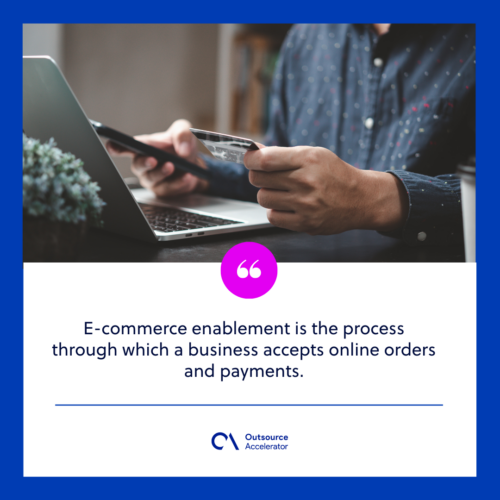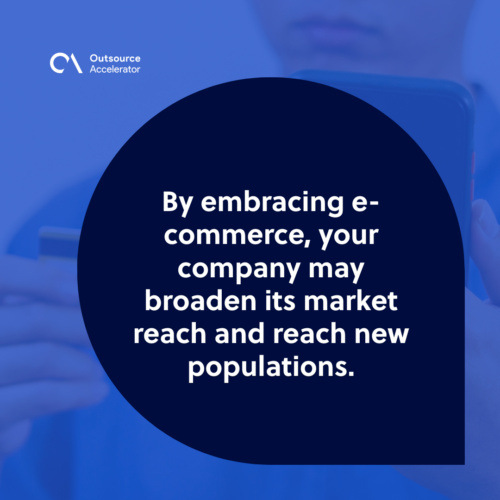5 e-commerce enablement strategies to elevate your business

With online shopping becoming the norm, standing out from the crowd and positioning your business as a frontrunner is crucial. E-commerce enablement might be the game-changer for your firm to succeed.
This article will explore the five ways e-commerce enablement sets the business apart from other competitive online enterprises.
Understanding e-commerce enablement
E-commerce enablement is the process through which a business accepts online orders and payments.
E-commerce enablement integrates various components and processes that enable businesses to operate online effectively.
These components include:
- Robust e-commerce platform
- Secure payment gateways
- Scalable hosting solutions
- Efficient inventory management systems
By effectively implementing these elements, businesses can create a seamless and user-friendly online shopping experience for their customers.

Implementation and examples of e-commerce enablement
To illustrate the concept of e-commerce enablement, let’s consider a few examples.
Example 1
Suppose you run a retail business that primarily operates through brick-and-mortar stores. By implementing e-commerce enablement, you can expand your reach by setting up an online store.
From there, customers can browse and purchase your products from the comfort of their homes. This increases your market reach and allows you to tap into the growing trend of online shopping.
Example 2
Another example could be a service-based business, such as a consulting firm.
By implementing e-commerce enablement, you can offer online consultations or sell digital products like e-books or online courses.
This enables you to reach a global audience and generate revenue beyond your local market.
3 effective e-commerce enablement best practices
Businesses should follow some best practices to leverage the full potential of e-commerce enablement.
Here are three effective e-commerce enablement best practices:
1. Choose the right e-commerce platform
Selecting the right e-commerce platform is crucial for successful e-commerce enablement.
Popular e-commerce platforms include Shopify, WooCommerce, and Magento—each offering unique features for different business needs.
You can utilize whichever platform best suits your needs. Consider things like usability, customization choices, scalability, and integration possibilities.
2. Integrate secure payment gateways
Ensuring secure online transactions is paramount to gaining customer trust and protecting sensitive financial information.
Integrate reliable and widely recognized payment gateways like PayPal, Stripe, Wise, or Authorize.Net. These gateways provide a secure and seamless payment experience for your customers.
3. Implement scalable hosting solutions
It is crucial to have a scalable hosting solution to handle increasing website traffic and ensure smooth operations.
Consider cloud-based hosting services that can automatically adjust resources based on demand. This ensures your website remains fast and accessible even during peak periods.
E-commerce enablement: 5 ways to outshine your competition
Now that you understand the fundamentals of e-commerce enablement, let’s explore how it can further assist your business in outshining the competition.
1. Enhanced customer convenience and accessibility
A well-designed online store with e-commerce enablement offers a streamlined shopping experience—allowing customers to make purchases whenever and wherever they choose.
This adaptability enhances not just client happiness but also loyalty. Enhancing this aspect can be done in a number of ways. One method is to get help from BPO firms like Remote Employee that offer customer and e-commerce support.
2. Expanded market reach and global presence
Crossing geographical barriers is one of the most significant benefits of e-commerce enablement.
By embracing e-commerce, your company may broaden its market reach and reach new populations.
You may also attract a worldwide audience and expand your consumer base beyond your local market using smart digital marketing methods such as:
- Search engine optimization
- Content marketing
- Influencer marketing
- Email marketing
Additionally, e-commerce enablement offers your company additional options and income sources. This helps your business thrive in a broader, more diversified industry.

3. Improved operational efficiency and cost savings
Implementing e-commerce enablement may significantly improve your company’s operational efficiency. It’ll also lower your firm’s expenses by simplifying your operations and removing manual work.
It’s because e-commerce enablement promotes using automated inventory management systems, order processing, and customer support.
This saves time and decreases the possibility of order mistakes and delivery delays.
4. Personalized shopping experience
E-commerce enablement allows you to create customized shopping experiences that resonate with your consumers. All you have to do is utilize your customer data and apply personalized client requests.
This degree of personalization not only boosts consumer engagement and happiness, but also promotes sales and cultivates long-term customer connections.
5. Data-driven insights and business growth
E-commerce enablement requires various analytics techniques and monitoring software. This process allows businesses to learn much about their customers’ habits, tastes, and trends.
Keep in mind, the more you know about your clients, the more you can tailor your products and marketing to them—resulting in increased customer satisfaction.
With this data-driven strategy, you may improve company choices, enhance marketing efforts, and locate new areas for expansion.
E-commerce enablement empowers business success
E-commerce capability is no longer a luxury but a need for organizations seeking to succeed in the digital marketplace.
Use the potential of e-commerce enablement to position your company for success in the ever-changing world of online commerce.







 Independent
Independent




